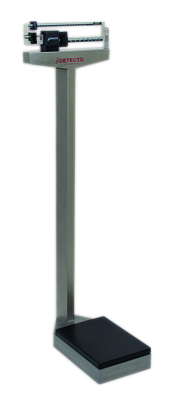Weight Scales
 Scales measure the force that is exerted on an object. Scales used to measure a person’s total weight or mass are often used to assess certain health parameters as well as growth and development over time. The total weight of an individual respective to his/her height as classified by body mass index (BMI). Combination weight scales and standiometers provide these measures for the calculation of BMI.
Scales measure the force that is exerted on an object. Scales used to measure a person’s total weight or mass are often used to assess certain health parameters as well as growth and development over time. The total weight of an individual respective to his/her height as classified by body mass index (BMI). Combination weight scales and standiometers provide these measures for the calculation of BMI.
Excess body weight or body fat is associated with an increased risk of for cardiovascular disease, diabetes, hypertension, hypertriglyceridemia, some cancers, and premature death from all causes. These diseases are collectively classified as cardiometabolic diseases.
- Body mass index (BMI) values between 18.5-24.9 are considered healthy. BMI values between 25.0-29.9 are considered to be “overweight” and at high risk for developing cardiometabolic diseases, and BMI values greater than 30.0 are considered to be “obese” and at very high risk for developing cardiometabolic diseases.
Clinical Weight Scales are a powerful tool for helping clients set and acheive their goals. Keep yourself and others accountable by making use of body fat analyzing tools like skin calipers, weight scales, and other BMI tracking equipment.
ProhealthcareProducts.com carries a variety of anthropometric measurement tools for healthcare assessment and growth and development evaluation.
If you need any help deciding which weight management tools suit your needs best please reach out to our customer service team on our Contact Us page. For product and shipping quotes please submit your request through our Request a Quote page.




